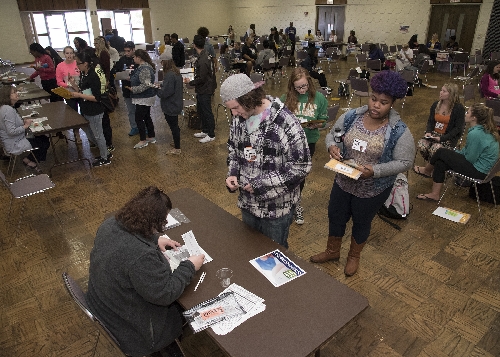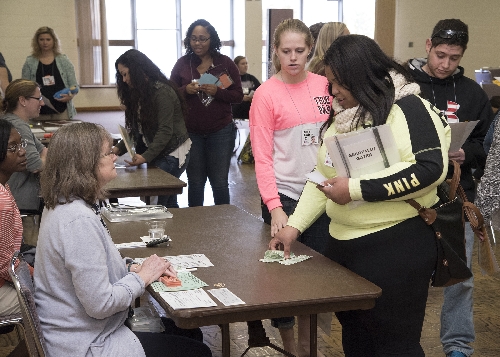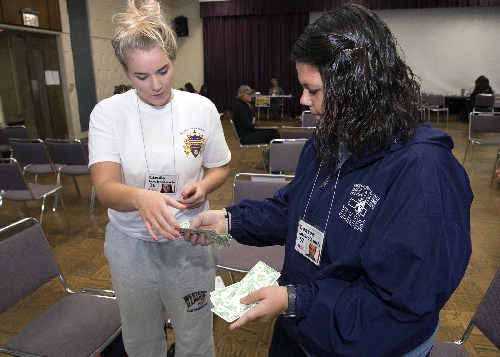University News
Simulation Provides Poverty Perspective for WIU Social Work Students
October 28, 2015
MACOMB, IL – "We felt the stress immediately. We looked at the bills we had to pay, and we added them up, and then looked at our income… and it just didn't make it." That's how Chandler Horrell (Macomb, IL), a Western Illinois University senior majoring in social work, described the experience of taking part in a poverty simulation last week at Western. "We had to pawn a couple of things to make ends meet, and then we had an illness come up and we had no way to pay for it. We learned we had to make sacrifices everywhere to make it all work."
Organized by Karen Perone, associate professor, and other faculty members in the WIU Department of Health Sciences and Social Work, the simulation was conducted by Lisa Fulkerson, director of the Henderson/Knox/McDonough/Warren counties unit of the University of Illinois Extension, last week in the WIU Union Heritage Room. Karen Zellmann, associate professor, said several social work students from all class levels (freshmen-seniors) attended the two-hour simulation.
"Once they graduate, our alumni are going to be working in a variety of social service settings and working with many people living at the poverty level and below," Zellmann explained. "The point of this simulation is to help them be more sensitive to the challenges and struggles faced by those individuals—people who are trying to get to work, trying to get their children fed, etc., on a daily basis. We talk about it in the classroom a lot, and many of them volunteer at the various agencies in the community, but this is one more way to make it real for them."
According to Fulkerson, she and her staff are trained to conduct the simulation exercise, which was developed at the University of Missouri,
"In our region, we provide it for agencies, universities, groups of students—whatever the need may be. The simulation starts with a discussion about Ruby Payne, author of the book, 'A Framework for Understanding Poverty: A Cognitive Approach.' After the simulation is over, we start with a debriefing, and in it, we talk about the poverty research and work she's done," she noted.
In the simulation exercise, the participants are divided into family units, representing people who are struggling to make ends meet.
"Each family unit has to get through four, 15-minute weeks. During those weeks, they have to try to get around to all of the agencies, they have to try to go to work, they have to try get their kids into school, into day care, as well as try to get their utilities paid, their rent paid, their food bought—all those things to take care of their basic needs," Fulkerson said.
Volunteers—including Missy Phillips, the director of advising in the College of Education and Human Services (COEHS), and several COEHS advisers—portrayed the staff members representing community agencies. Other volunteers included students in the WIU Department of Health Science and Social Work, as well as community representatives.
After each "week," the simulation includes a mini debriefing, during which the simulation leader asks participants to raise their hands if they didn't eat this week.
"During one of the weeks, we found that only two of the families remembered to buy food," she explained.
Fulkerson also noted the simulation can help make social work educators and those who work at social work agencies aware of how individuals living in poverty may not know about other community resources available to them.
"One of the things we find out when we do this with students is they know about many of the governmental agencies, but most of them have never dealt with a pawn shop to get money to help pay bills. Most of them don't know about community action agencies either. They also have little knowledge about what churches and other community organizations, such as food pantries, can offer," she explained.
Fulkerson said during the simulation, she asks the individuals portraying the staff at the agencies and community-based resources "to make it realistic."
"We've all gone to places where you encounter the kindest, most wonderful person who will bend over backwards to help you out and to help solve your problems, and we've all gone to places where the people working there should never deal with the public," she noted.
Zellmann, who portrayed a worker at a payday loan site during the simulation, said she observed that the students were a bit taken aback by the obstacles they faced when trying to access services in the community.
"I think they were surprised when it felt so personal to them. I role-played a worker at this place where they had to get bus passes and where they had to cash checks, and I wasn't always the friendliest. I could see that they may be wondering, 'Why is this person being short with me?' I think they were a bit shocked about how challenging and how hard it all was," she said.
For Horrell, who has plans to get her master's degree in social work, taking part in the simulation was enlightening.
"I may not know exactly how it feels, but now I have better idea about all the stress and the things people have to worry about when they have to try to work with all of the people at the various agencies," Horrell added.
Zellmann said, ultimately, the simulation will help prepare her students and other WIU social work students to be more effective in their current and future work with those living in poverty.
"I think it also helps educate people about the number of people living in poverty in our state and in our country," she added. "The more information we have about what life is like for them and what they have to do on a daily basis, I think that is important for everyone."
For more information, contact Zellmann at (309) 298-2109 or via email at KT-Zellmann@wiu.edu. For more information about the poverty simulation, contact Fulkerson at (309) 837-3939 or via email at lfulkers@illinois.edu.
Posted By: Teresa Koltzenburg (WIUNews@wiu.edu)
Office of University Communications & Marketing




Connect with us: